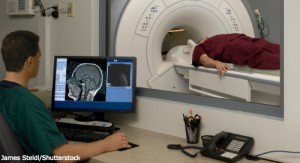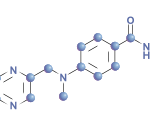 In a comparison study using MRI endpoints, the validated RAMRIS score (Outcome Measures in Rheumatology Clinical Trials RA MRI score), quantitative RAMRIS and dynamic contrast-enhanced MRI, tofacitinib treatment led to early inflammation reduction and structural damage inhibition in patients with rheumatoid arthritis (RA).1
In a comparison study using MRI endpoints, the validated RAMRIS score (Outcome Measures in Rheumatology Clinical Trials RA MRI score), quantitative RAMRIS and dynamic contrast-enhanced MRI, tofacitinib treatment led to early inflammation reduction and structural damage inhibition in patients with rheumatoid arthritis (RA).1
MRI measures of bone marrow edema and synovitis have been shown to be highly sensitive to treatment with conventional disease-modifying anti-rheumatic drugs (DMARDs). Adult, methotrexate (MTX)-naive, early RA patients were treated with 10 mg tofacitinib twice daily with or without MTX, or MTX monotherapy (in doses up to 20 mg weekly), and assessed for radiographic changes of joint-space narrowing and erosions, as well as ACR20, ACR50 and ACR70 responses.
This research was a one-year, randomized, double-blind, parallel-group study. A total of 109 patients were evaluated. In total, 78% of tofacitinib-plus-MTX-treated patients completed the study, 75% of tofacitinib monotherapy-treated patients completed the study, and 58% of MTX monotherapy-treated patients completed the study.
The RAMRIS bone marrow edema scores at Month 3: −1.24 for tofacitinib plus MTX and −1.32 for tofacitinib monotherapy. These changes continued through the 12 months of the study. The RAMRIS bone marrow edema scores at Month 6: −1.55 for tofacitinib plus MTX and −1.74 for tofacitinib monotherapy. Both results were statistically significant compared with MTX monotherapy. Numerical improvements in RAMRIS synovitis at Month 3 were −0.63 for tofacitinib plus MTX and −0.52 for tofacitinib monotherapy—also statistically significant compared with MTX monotherapy.
The ACR20 and ACR50 responses were higher for tofacitinib-treated patients at Month 12. Some results were statistically significant compared with MTX monotherapy. ACR70 responses at Month 12 were higher for tofacitinib-treated patients compared with patients who received MTX monotherapy, but not statistically significant.
Clinically, patients treated with tofacitinib had a better response to treatment than patients treated with MTX monotherapy. The ACR20, ACR50 and ACR70 responses were measured, as was the DAS28-4 (ESR). Patients treated with tofacitinib had numerically higher response rates for all four measurements compared with the MTX monotherapy group.
This study demonstrated that different MRI tests show that tofacitinib treatment leads to early reduction of inflammation and inhibition of the progression of structural damage in adults with early RA.
Michele B. Kaufman, PharmD, CGP, RPh, is a freelance medical writer based in New York City and a pharmacist at New York Presbyterian Lower Manhattan Hospital.
References
- Conaghan PG, Østergaard M, Bowes MA, et al. Comparing the effects of tofacitinib, methotrexate and the combination, on bone marrow oedema, synovitis and bone erosion in methotrexate-naive, early active rheumatoid arthritis: results of an exploratory randomised MRI study incorporating semiquantitative and quantitative techniques. Ann Rheum Dis. 2016 Jan 25. doi:10.1136/annrheumdis-2015-208267.
